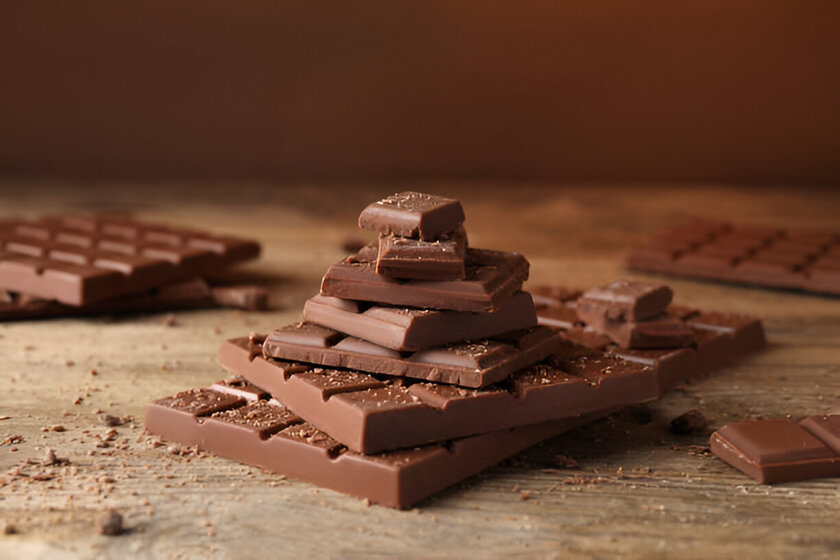Milk chocolate is one of the most popular sweet treats worldwide. Loved for its creamy texture and sweet flavor, it’s a staple in candy bars, desserts, and snacks. While milk chocolate is enjoyed for its taste, many people are curious about its nutritional profile—especially whether it contains caffeine. In this article, we’ll explore the relationship between milk chocolate and caffeine, breaking down everything you need to know.
What is Caffeine?
Caffeine is a natural stimulant found in various plants, including coffee beans, tea leaves, cacao beans, and kola nuts. Known for its ability to boost alertness and energy levels, caffeine is a widely consumed psychoactive substance. It works by stimulating the central nervous system, helping people feel more awake and focused.
While caffeine is most commonly associated with coffee and energy drinks, it can also be present in other foods and beverages—including chocolate.
Understanding Milk Chocolate
Milk chocolate is made by combining cacao solids, cocoa butter, milk, and sugar. Its creamy and sweet taste comes from the added milk and sugar, making it less bitter than dark chocolate. Compared to its dark counterpart, milk chocolate typically contains lower levels of cacao, which affects its caffeine content.
The cacao solids used in chocolate are derived from cacao beans, which naturally contain caffeine. Therefore, the caffeine content in chocolate depends on the amount of cacao used in its production.
Caffeine Content in Milk Chocolate
Milk chocolate does contain caffeine, but in relatively small amounts compared to coffee or dark chocolate. The exact caffeine content varies depending on the brand, recipe, and cacao percentage. On average, a 1-ounce (28-gram) serving of milk chocolate contains about 5-10 milligrams of caffeine.
To put this into perspective:
- Milk Chocolate Bar (1.55 oz/44g): Approximately 9-12 mg of caffeine.
- Dark Chocolate (1 oz/28g): Around 20-50 mg of caffeine.
- Coffee (8 oz/240 ml): 95-200 mg of caffeine.
As you can see, milk chocolate contains significantly less caffeine than dark chocolate or a cup of coffee.
Why Does Milk Chocolate Have Caffeine?
The caffeine in milk chocolate comes from the cacao solids used in its production. Cacao beans naturally contain caffeine and another stimulant called theobromine. While theobromine is present in higher quantities in chocolate, caffeine is still present in smaller amounts.
Caffeine and theobromine are both part of a group of compounds known as methylxanthines, which contribute to chocolate’s stimulating effects. The levels of these compounds depend on the cacao content—and since milk chocolate contains less cacao than dark chocolate, it has lower caffeine levels.

Health Implications of Caffeine in Milk Chocolate
For most people, the small amount of caffeine in milk chocolate is unlikely to cause any significant effects. However, it’s worth considering in certain situations:
1. Sensitivity to Caffeine
Some individuals are more sensitive to caffeine than others. Even small amounts of caffeine from milk chocolate can lead to mild symptoms such as jitteriness, restlessness, or difficulty sleeping.
2. Children
Children are more sensitive to caffeine due to their smaller body size and lower tolerance levels. While milk chocolate is generally considered safe for kids, excessive consumption could contribute to hyperactivity or sleep disturbances.
3. Pregnancy
Pregnant women are often advised to limit their caffeine intake. While the caffeine in milk chocolate is minimal, it’s still important to account for all sources of caffeine to stay within recommended limits.
4. Medical Conditions
Individuals with certain health conditions, such as heart arrhythmias or anxiety disorders, may need to limit their caffeine intake. In these cases, being aware of caffeine sources, including milk chocolate, is crucial.
Comparing Milk Chocolate to Other Chocolate Types
Dark Chocolate
Dark chocolate has a higher cacao content, ranging from 50% to 90%. This means it contains significantly more caffeine than milk chocolate. For example, a 1-ounce serving of dark chocolate with 70-85% cacao contains about 20-50 mg of caffeine.
White Chocolate
White chocolate does not contain caffeine because it is made from cocoa butter rather than cacao solids. Without cacao solids, there is no caffeine in white chocolate.
Hot Chocolate
Hot chocolate made with milk chocolate contains a small amount of caffeine, usually less than 5 mg per serving. If made with dark chocolate or cacao powder, the caffeine content will be higher.
Does Caffeine in Milk Chocolate Affect Sleep?
For most people, the small amount of caffeine in milk chocolate is unlikely to interfere with sleep. However, those who are particularly sensitive to caffeine or consume large quantities of milk chocolate close to bedtime might experience difficulty falling asleep. To avoid this, consider enjoying milk chocolate earlier in the day.
How to Identify Caffeine Content in Milk Chocolate
If you’re concerned about caffeine intake, check the packaging of your milk chocolate product. Many manufacturers provide detailed nutritional information, including the cacao percentage. A lower cacao percentage typically indicates less caffeine.
Alternatively, you can research specific brands online or contact manufacturers directly for detailed information about their products.
Health Benefits of Milk Chocolate
In addition to its delicious taste, milk chocolate offers some health benefits, primarily due to its cacao content:
- Antioxidants: Cacao contains flavonoids, which are antioxidants that help protect the body from oxidative stress.
- Mood Boosting: Chocolate stimulates the release of endorphins and serotonin, which can improve mood.
- Minerals: Milk chocolate provides essential minerals such as magnesium, calcium, and iron.
However, it’s important to consume milk chocolate in moderation due to its high sugar and calorie content.
Tips for Enjoying Milk Chocolate Responsibly
- Practice Moderation: Enjoy milk chocolate as an occasional treat rather than a daily habit.
- Choose Quality Products: Opt for high-quality milk chocolate with a balanced ingredient list.
- Be Mindful of Timing: Avoid consuming milk chocolate close to bedtime if you’re sensitive to caffeine.
- Pair with Healthy Foods: Combine milk chocolate with nutrient-rich foods, such as nuts or fruits, for a balanced snack.
Conclusion
Yes, milk chocolate does contain caffeine, but the amount is minimal compared to other sources like coffee or dark chocolate. For most people, the caffeine in milk chocolate is unlikely to cause significant effects. However, it’s essential to be mindful of consumption, especially for children, pregnant women, and individuals sensitive to caffeine.
By understanding the caffeine content in milk chocolate and consuming it in moderation, you can enjoy this sweet treat without worrying about its effects on your health or sleep. Whether as a snack, dessert, or ingredient in recipes, milk chocolate remains a delightful indulgence for chocolate lovers everywhere.
For more insights into food and nutrition, visit Chefiality.pk.



